
Have you ever wondered, “What are the best strings for classical guitar?”. Well, if you have, then you’ve come to the right place. The market is filled with so many options for classical and nylon guitar strings today, so we’re here to help.
We’ve compiled a list of the 8 best classical guitar strings available today, along with some tips on how to choose the best one for you.
What are the Best Classical Guitar Strings?
1. Savarez 540R Alliance HT Classic Guitar Strings – Best Overall
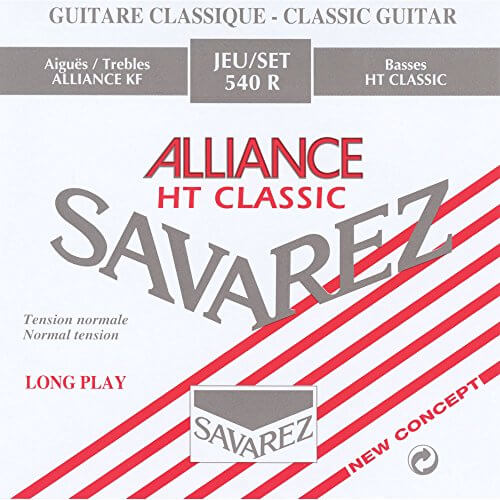
Specifications
- Material: Carbon Trebles, Silver-Plated Wound Basses
- Durability: Uncoated
- Sound: Brilliant, Powerful, Large Overtones
Savarez is a French company that has been making guitar strings for hundreds of years now! Their strings are globally renowned and are used by many famous classic players. The Savarez 540R Alliance HT is one of their most popular sets of strings, and offers a great sound with good durability.
The 540R features two different types of strings for trebles and basses, as is the case with most classical guitar strings. The trebles are plain, monofilament strings made of fluoro-carbon, which retains the nuances of your playing and offers a crystal clear tonality. The basses are traditionally wound strings, consisting of a nylon wrap with silver-plating on top, resulting in a stiff, powerful sound with a large spectrum of overtones.
The 540R are quite durable, and they can last from a few weeks to a few months easily based on your playing habits. The 540R is the normal tension variant, and if you prefer high-tension strings or mixed-tension ones, then Savarez offers those as well. The string set is available in longer lengths too, for guitars with longer scale lengths.
If you want classical guitar strings with a brilliant, powerful sound, then you should definitely go for the Savarez 540R. These strings have stood the test of time as the best classical guitar strings; professionals still love to use these strings for a well-articulated sound, fast and dynamic response, and an overall better playing experience.
2. Martin M160 Silverplated Ball End Classical Guitar Strings – Budget Pick
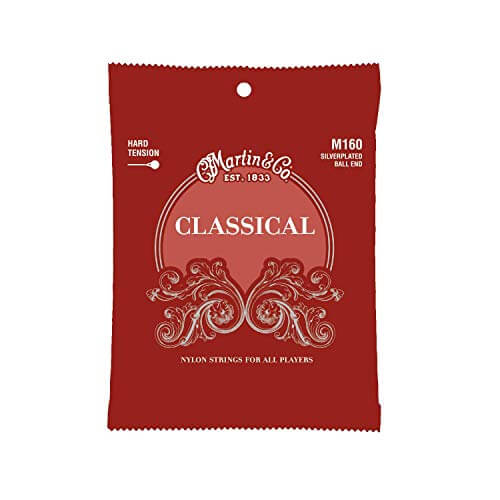
Specifications
- Material: Crystal Nylon
- Durability: Uncoated
- Sound: Warm, Clear
Martin is a renowned manufacturer of acoustic and classical guitars, a wide variety of strings, as well as accessories. The Martin M160 is one of the most popular choices amongst classical guitar players for their uncompromising tone and playability at a very affordable and reasonable price.
The M160 classical guitar strings are silver-plated, which resists corrosion and results in a longer lifespan, and is more comfortable for the fingers as well. These strings have a very warm, and clear tone, with balanced treble and bass, and offer excellent tuning stability as well.
The Martin strings have ball ends, which makes it easier and quicker to re-string them on a normal bridge as opposed to ‘tie-on’ strings. Martin offers them in two variants: normal tension, which is the M160, and a high-tension variant with 80/20 bronze called the M260.
If you want great classical guitar strings on a budget that perform well in most situations, then the Martin M160s are an amazing choice. With warmth and clarity that’s required for classical pieces, stable tunings, silver-plating for more durability, and two tension variants, these strings are indispensable for aspiring classical guitarists.
3. D’Addario XT Silver Plated Copper Classical Guitar Strings – Most Durable
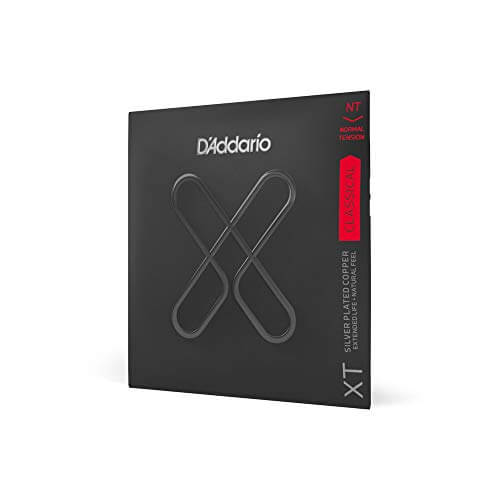
Specifications
- Material: Silver-Plated Copper
- Durability: Coated
- Sound: Bright, Clear
D’Addario is one of the most popular manufacturers of guitar strings and accessories worldwide, and its products are used by many famous artists. The new XT series of strings is one of their best till now, and the XT Classical Strings offer new innovations for classical players to achieve a better sound through their guitars.
The XT Classical Strings are made of a combination of the treble strings from their Pro-Arte series, with composite bass strings that have silver plating on them. All of the strings from the XT lineup have a thin treatment of coating done on them, which extends their lifespan and durability multi-fold while maintaining clarity and comfort while playing. According to classical guitarist Carlotta Dalia :
D’Addario XT Classical Strings are simply perfect. With these strings, I get the sound I imagine, in the simplest way. The softness of the attack, plus the projection, made me fall in love with them.
The surprising thing about the XT series is that, though they are coated strings, they ring out and feel just like regular strings. So you don’t have to sacrifice tone or feel for the added durability, and their tuning stays stable as well. With these innovations, the XT strings have raised the bar for guitarists and string manufacturers alike.
If you’re looking for premium coated classical guitar strings, then look no further than the D’Addario XT Classical Strings. With a coating that feels just like uncoated strings, extended lifespan, bright and sharp tones, and amazing playability, the XT are not only the most durable strings, but one of the best too.
4. Ernie Ball Earthwood Folk Nylon Ball End Set
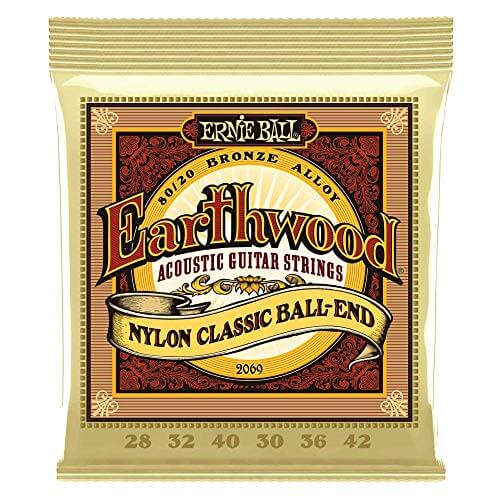
Specifications
- Material: Nylon
- Durability: Uncoated
- Sound: Bright, Balanced
Ernie Ball makes some of the best guitars and guitar accessories, including strings for a variety of different instruments. The Ernie Ball Earthwood series is a staple for many guitar players, one of their most popular products. The Earthwood Folk Nylon is made specifically with classical guitars in mind, designed to offer a smooth playing experience.
The Earthwood Folk Nylon’s treble strings consist of a solid, clear nylon filament for a balanced tone with a great projection and crystal highs. The bass strings consist of an 80/20 bronze wrapped around a multifilament nylon core, which offers a rich sound with a percussive attack and great overtones.
The Folk Nylon strings have ball ends, which makes it really easy to install and replace them as compared to tie-on strings. These strings come in a normal tension with gauges of .028, .032, .040p, .030, .036, and .042 inches from lightest to heaviest. They feel smooth under your fingers and are well-suited for rhythmic and percussive styles of play.
If you want bright and balanced classical guitar strings at an affordable price, you should certainly look at the Ernie Ball Earthwood Folk Nylon classical set. With ball ends that make it easy to install, a simple design that works well and sounds great, and a percussive feel to them, they are a great, high-quality string set for a variety of players.
5. D’Addario Pro-Arte EJ46 Nylon Classical Guitar Strings
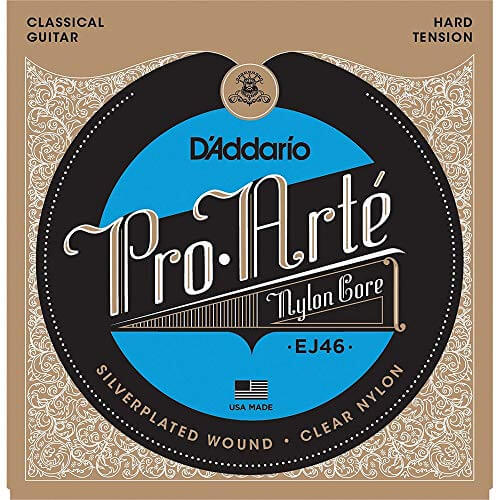
Specifications
- Material: Nylon
- Durability: Uncoated
- Sound: Warm, Full-Bodied
The second string set by D’Addario on this list, the Pro-Arté series is one of their most popular string sets for classical guitars, used by many players worldwide. These strings offer consistently high-quality performance at an affordable price, making it very suitable for both beginners and professionals.
The Pro-Arté series have nylon clear treble strings, which are precision-cut with lasers for greater accuracy in their diameter and thickness, resulting in a thick, full-bodied tone with crisp highs. The bass strings have silver-plated copper winding on a multifilament nylon core, and they have a warm tone with great projection as well.
The Pro-Arté are classic tie-on strings, so they might require some experience to re-string properly. They are available in a wide variety of different tensions like normal, light, hard, extra hard, as well as different materials to suit your sound. With their precision manufacturing in the USA, these strings are very consistent across each package.
If you’re looking for great all-round strings that perform well in a variety of situations, then the D’Addario Pro-Arté strings are a fantastic choice. Each string set has consistency, with a full-bodied tone and smooth feel, which ensures that they’ll work well for practice, live performances, and studio recordings equally well.
6. Augustine Classic Blue set, High Tension Classical Guitar Strings
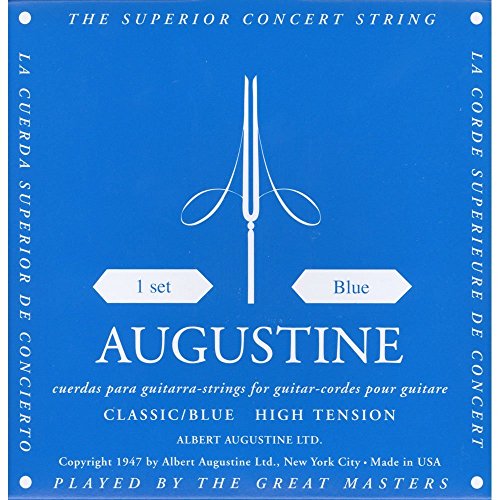
Specifications
- Material: Nylon
- Durability: Uncoated
- Sound: Warm, Balanced
Augustine has been manufacturing great quality strings for many years now, with a large roster of artists that use their products. Their classical strings are especially popular, and they come in a variety of sets with different tensions and materials. The Augustine Blue set is one of the most popular sets for their affordability and practicality.
The Classic Blue set features a mixed tension between the trebles and the basses. The treble strings, made of clear nylon monofilaments, are regular medium tension strings with crisp, well-defined highs and are easy on the fingers. The bass strings, made of silver-plated copper wound on nylon, are slightly high tension, for a more ‘boomy’ sound, greater projection, and overall louder sound. According to famed classical guitarist Uros Baric :
They have this velvety, dark tone that reminded me of old masters, and the sound I found very charming.
While playing, these strings combine well to offer a smooth and pleasant experience. If, however, the high tension strings are uncomfortable for you, we recommend you to try out the Red set, which has low tension strings. For most players, the hybrid strings offer a different playing experience that’s useful for fingerstyle pieces.
If you’re looking for high-quality classical guitar strings with a warm tone, then the Augustine Classic Blue set is a good choice. With their hybrid tension that offers a unique playing experience, and years of string manufacturing experience, these strings are a great alternative to other brands and won’t cause you to break the bank either.
7. Ernie Ball Ernesto Palla Nylon Clear and Silver Classical Tie On Set
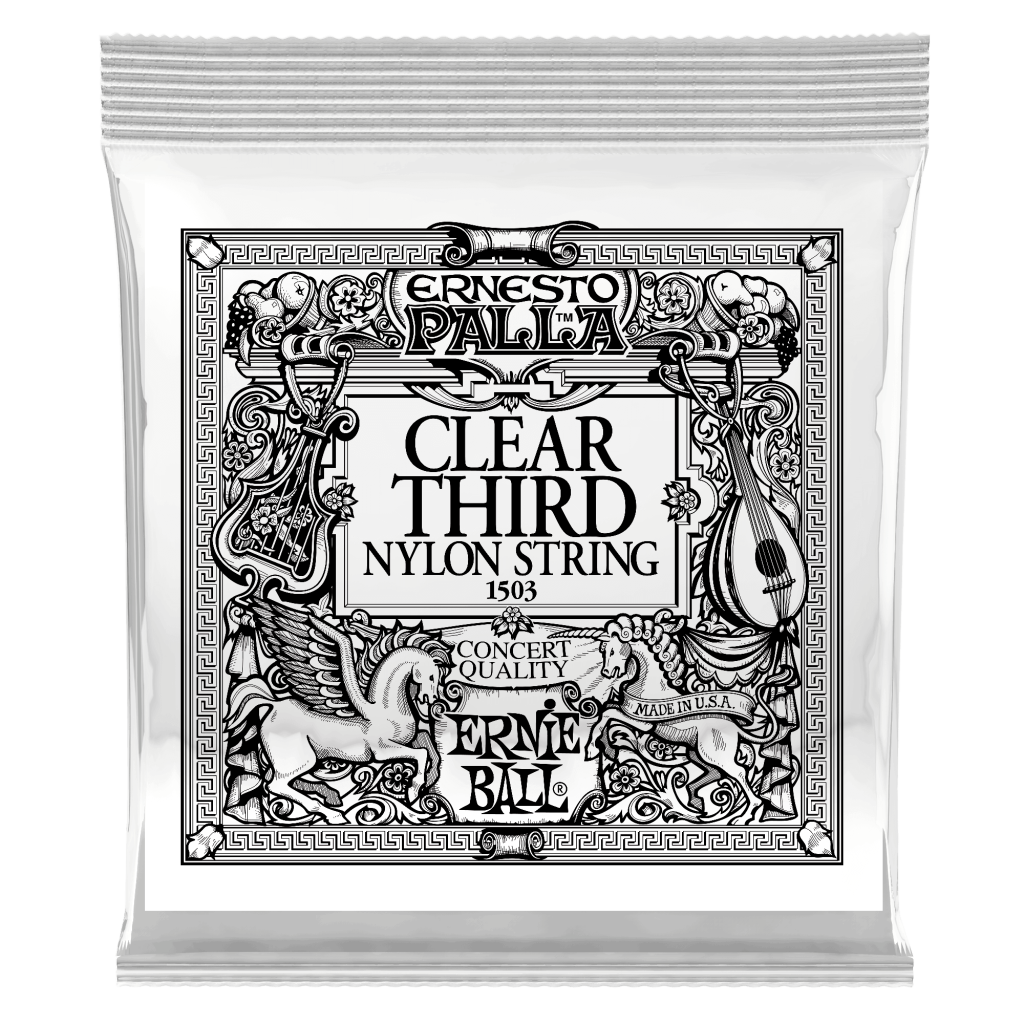
Specifications
- Material: Nylon
- Durability: Uncoated
- Sound: Balanced, Concert-Tone
The second entry on the list by Ernie Ball, the Ernesto Palla series of strings were designed to provide professional quality performance and tone for players who need the best. These strings offer consistency, accuracy, and long life, making it a great choice for concert guitarists.
The Ernesto Palla string set features clear nylon monofilament treble strings and silver-plated copper wrap wires on a nylon floss core for the bass strings. The treble strings have a smooth, rice tone with crystal highs, while the bass strings offer a strong, well-projected tone with defined bass notes.
These strings come in a hermetically sealed foil packaging that ensures that the strings arrive fresh and free of any corrosion. These strings have medium tension, which offers a good balance between playability and dynamics, with superb consistency across each package.
If you’re looking for concert-level classical guitar strings, then certainly consider the Ernie Ball Ernesto Palla nylon classical guitar strings set. With optimum clarity, consistency, amazing feel, and balanced tonality, these strings are designed for the professionals, striving to achieve excellence in their sound.
8. Fender 130 Classical/Nylon Guitar Strings
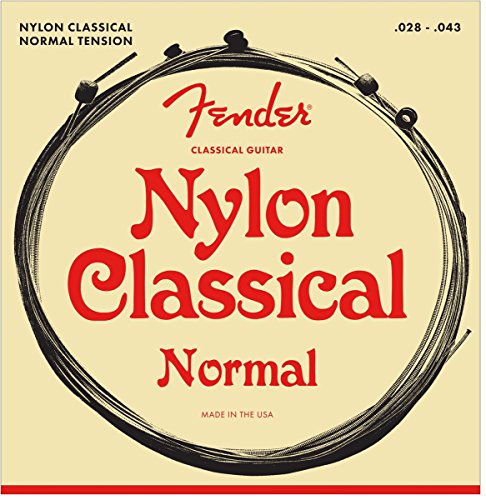
Specifications
- Material: Nylon
- Durability: Uncoated
- Sound: Warm, Clear
Fender is practically a household name when it comes to guitar players, reputed for their exceptional guitar manufacturing as well as amplifiers, effects, and other accessories. The Fender 130 series of nylon guitar strings are used by many Fender players around the world, as they provide high-quality nylon strings for guitar players at an affordable price.
The Fender 130 nylon strings have clear nylon trebles, which produce a crystal clear tone with crisp highs and a lot of depth to the sound. The basses are wound with pure silver, making them feel very smooth to the touch and optimizing the projection, while also minimizing finger noise. These nylon strings offer a warm and clear sound, with great projection, making them great for rhythmic strumming and even flamenco.
Fender offers these strings in both tie-end and ball-end, where the 100’s have tie-on ends, while the 130’s have ball ends, giving you the choice to choose between what’s comfortable for you. Both string sets have gauges of .028, .029, .032, .035, .040, and .043, which is a regular medium tension that’s comfortable to play and offers good loudness and dynamics.
If you’re looking for some great classical guitar strings to pair with your beautiful Fender guitar, then the Fender 130 nylon classical guitar strings are definitely a great choice. With optimum projection, a warm and clear sound, pure silver coated basses, and the option of tie-on or ball-end strings, the 130 series is a great all-around set of strings that’ll surely satisfy most players.
What To Know Before Buying a Classical Guitar String?
When choosing the best classical guitar strings for your guitar, it’s important to remember that strings are a personal preference, and the best way to decide is to try several sets and see what suits you best. But here are some important factors you should keep in mind:
Gauge And Tension
When we talk about string gauge and tension, we basically mean the diameter of the string, which is often mentioned in inches as 0.024, 0.032, etc. This is a crucial factor in how easy it is to press or bend the strings, and their characteristic dynamics and loudness.
Classical guitar strings come in a variety of different gauges and string tensions. In fact, manufacturers each have their own perception of a particular gauge, resulting in a different feel amongst strings from different manufacturers. Normal gauge, or normal-tension, strings are the most common, and offer a great balance between playability, dynamics, and loudness .
Hard-tension strings offer more loudness, and more room for dynamics, but at the cost of playability.
Seasoned professionals often prefer high tension strings as it gives them greater control over the dynamics of their performance. But if you’re a beginner, we’d recommend you try out a normal gauge, or even a low tension string set first as they are easy to play, and then determine whether it’s comfortable enough for you.
Material And Sound
Classical guitar strings come in a variety of materials, and even when constructed with similar materials, they still have differences in their tonality and sound signature. Generally, trebles and basses are made of different materials. But with classical guitar strings, nylon is a common factor that’s present in almost all the products.
The most common material used for the 1st, 2nd, and 3rd strings (trebles) is a clear nylon monofilament, which has a crisp sound to it with crystal-clear highs. Other materials used include carbon fiber, composite, titanium, and black nylon guitar string, each of which have different tonal characteristics.
For the 4th, 5th, and 6th strings (basses), it’s generally a multifilament with a silver-plated copper wrap around it, which has a great projection and good overtones. Other materials include an 80/20 bronze wrap, which is brighter in sound. Choose a string set that sounds appealing to your ears.
Durability
When it comes to durability, or lifespan of the strings, the primary factor to consider with classical guitar strings is whether they are coated, or uncoated. Coated strings feature a special coating around them that helps prevent corrosion due to environmental forces, as well as grime build-up due to hand sweat and oil. This makes them last much longer than as opposed to uncoated strings.
Coated strings have a warmer tone and a smoother feel compared to uncoated strings.
But if you want a more raw tone, with better dynamics and a brighter tone, you may prefer uncoated strings. Many professional players prefer the sound of uncoated strings, despite the trade-off of lifespan. Hence, you should try both and see what suits you and your guitar better.
The ending of the strings makes a difference too. Strings with ball endings are easier to re-string. Conversely, tie-on nylon strings require experience to be able to tie them on properly for a stable tuning. Neither of these affect the sound much, and so it’s a matter of convenience and preference.
FAQs
What tension should classical guitar strings be?
The tension that classical guitar strings should be ultimately comes down to a matter of personal preference. Generally, people prefer low or medium tension strings as they offer a comfortable playing experience, especially for beginners. High tension strings may offer better dynamics and loudness, but they may not be comfortable for you if you are inexperienced.
What is the difference between hard tension and normal tension classical guitar strings?
The difference between hard tension and normal tension classical guitar strings lies in their loudness, dynamics, and of course, the player’s comfort. As stated in the previous answer, some people may prefer hard tension (or high tension), while some may feel more comfortable with low tension strings. Hard tension strings respond better to fingerpicking dynamics, and have more body and depth to their sound, as well as loudness.
Do classical guitars have all nylon strings?
Yes, classical guitars generally have nylon strings on them, as these suit the style of play and genre of music for fingerstyle. However, different manufacturers do produce strings out of different materials, such as carbon or composite, or even titanium, and sometimes the bass strings have silver-plated or bronze windings as well. All these affect the guitar’s sound and playability, but nylon strings are still the most common.
Is it OK to put steel strings on a classical guitar?
No, it is not OK to put steel strings on a classical guitar. The tension of classical guitar strings is very different from that of steel strings, and if you put steel strings on a classical guitar, it may damage it, especially the neck, due to an unbalanced tension. If you’d really like to try steel strings on a classical guitar, we recommend taking it to a luthier who can modify your guitar’s neck to suit steel strings.
How often should you change classical guitar strings?
You should change classical guitar strings whenever they feel dull in sound, or uncomfortable to corrosion and grime build-up. This may be required once in a month if you play very regularly, or once in 2-3 months if you play less regularly and your strings have corrosion resistance (such as in coated strings). It’s recommended to clean the nylon strings on guitar regularly to extend their lifespan.
